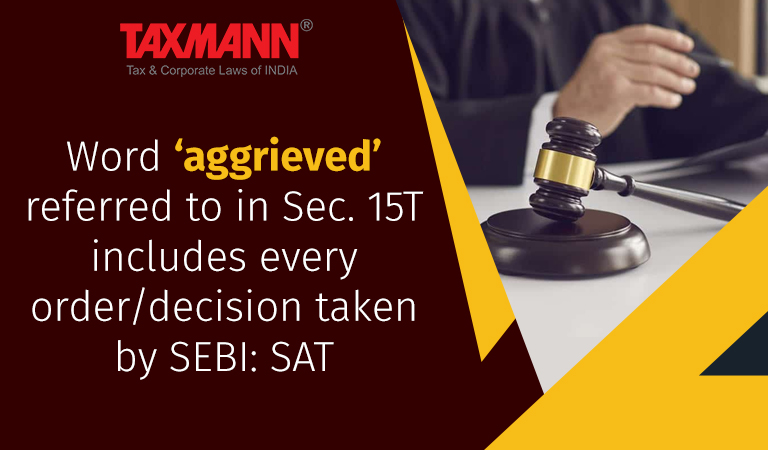Word ‘aggrieved’ referred to in Sec. 15T includes every order/decision taken by SEBI: SAT
- Blog|News|Company Law|
- 3 Min Read
- By Taxmann
- |
- Last Updated on 21 October, 2022

Case Details: JK Paper Ltd. v. Securities and Exchange Board of India - [2022] 143 taxmann.com 94 (SAT - Mumbai), Dated: 13.07.2022
Judiciary and Counsel Details
-
- Justice Tarun Agarwala, Presiding Officer, M.T. Joshi, Judicial Member
& Ms Meera Swarup, Technical Member - Pradeep Sancheti, Sr. Adv., Ameya Gokhale , Ms Radhika Indapurkar & Harit Lakhani, Advs. for the Appellant.
- Kevic Setalvad, Sr. Ad., Mihir Mody, Arnav Misra & Mayur Jaising Advs. for the Respondent.
- Justice Tarun Agarwala, Presiding Officer, M.T. Joshi, Judicial Member
Facts of the Case
In the instant case, the appellant company formed an Employee Welfare Trust known as “JK Paper Employees Welfare Trust”. Approximately 97% of the assets of the trust were the shares of the appellant company, which worked out to approximately 4.73% of the total share capital of the appellant’s Company.
On 28.10.2014, the SEBI (Share Based Employee Benefits) Regulations, 2014 were notified. The appellant through a series of communication sought information with regard to the applicability of the Regulations. Further, the SEBI required the appellant company to seek guidance on the applicability of the Regulations of 2014 under the Informal Guidance Scheme.
Accordingly, an application was made under the Informal Guidance Scheme. SEBI vide letter submitted that the Regulations of 2014 would apply to the Trust and the Employees Welfare Scheme.
Thereafter, the appellant submitted an application seeking exemption/relaxation from strict compliance of regulations 3(11), 26(2) read with regulations 31(2)(b)(ii) of 2014 Regulations. However, the said application was rejected by the Competent Authority.
Further, it was contended that the impugned order was not an appealable order under section 15T as the impugned order didn’t adversely affect the rights of the appellant. Thereafter, an appeal was made to the Securities Appellate Tribunal (SAT) against the order passed by the Competent Authority of SEBI.
It was observed that the Competent Authority considered the selling of shares by trust as one of the mitigating factors for rejecting the application without considering the fact that shares were sold in order to pay loans, which was allowed under regulation 3(15)(e) and which in fact had not been disputed by the SEBI.
Further, it was observed that the Competent Authority failed to consider the undertaking given by the appellant regarding not to buy or sell any shares in future, which was a crucial consideration.
SAT Held
The SAT held that the exemption application had to be treated on merits on grounds raised by the appellant in its application and the same couldn’t be rejected on the ground that the appellant was not in compliance with the Regulations. Therefore, the impugned order by SEBI couldn’t be sustained and the matter was remitted back to the Authority of the SEBI to pass a fresh order in accordance with the law.
Further, the SAT held that any person aggrieved by the order of SEBI can prefer an appeal to SAT under section 15T of the SEBI Act, 1992. Further, the word ‘aggrieved’ doesn’t mean that person can only be aggrieved if order causes any damage or prejudice; it include every order or decision taken by the SEBI which effect rights of the parties.
List of Cases Reviewed
-
- HB Stockholdings Ltd. v. SEBI [2012] 21 taxmann.com 247/113 SCL 295 (SAT) (para 21)
- Shah Babulal Khimji v. Jayaben D. Kania [1981] 4 SCC 8 (para 21) distinguished.
List of Cases Referred to
-
- HB Stockholdings Ltd. v. SEBI [2012] 21 taxmann.com 247/113 SCL 295 (SAT) (para 17)
- Shah Babulal Khimji v. Jayaben D. Kania [1981] 4 SCC 8 (para 17)
- Bhargav Ranchhodlal Panchal v. SEBI [Appeal No. 471 of 2020, dated 5-7-2022] (para 19)
- Bharat Jayantilal Patel v. SEBI [2011] 3 taxmann.com 171 (SAT) (para 20)
- Ashok Dayabhai Shah v. SEBI [2019] 111 taxmann.com 290 (SAT – Mum.) (para 24)
- SEBI v. Ashok Dayabhai Shah [2020] 113 taxmann.com 539 (SC) (para 24).
Disclaimer: The content/information published on the website is only for general information of the user and shall not be construed as legal advice. While the Taxmann has exercised reasonable efforts to ensure the veracity of information/content published, Taxmann shall be under no liability in any manner whatsoever for incorrect information, if any.

Taxmann Publications has a dedicated in-house Research & Editorial Team. This team consists of a team of Chartered Accountants, Company Secretaries, and Lawyers. This team works under the guidance and supervision of editor-in-chief Mr Rakesh Bhargava.
The Research and Editorial Team is responsible for developing reliable and accurate content for the readers. The team follows the six-sigma approach to achieve the benchmark of zero error in its publications and research platforms. The team ensures that the following publication guidelines are thoroughly followed while developing the content:
- The statutory material is obtained only from the authorized and reliable sources
- All the latest developments in the judicial and legislative fields are covered
- Prepare the analytical write-ups on current, controversial, and important issues to help the readers to understand the concept and its implications
- Every content published by Taxmann is complete, accurate and lucid
- All evidence-based statements are supported with proper reference to Section, Circular No., Notification No. or citations
- The golden rules of grammar, style and consistency are thoroughly followed
- Font and size that’s easy to read and remain consistent across all imprint and digital publications are applied



 CA | CS | CMA
CA | CS | CMA
